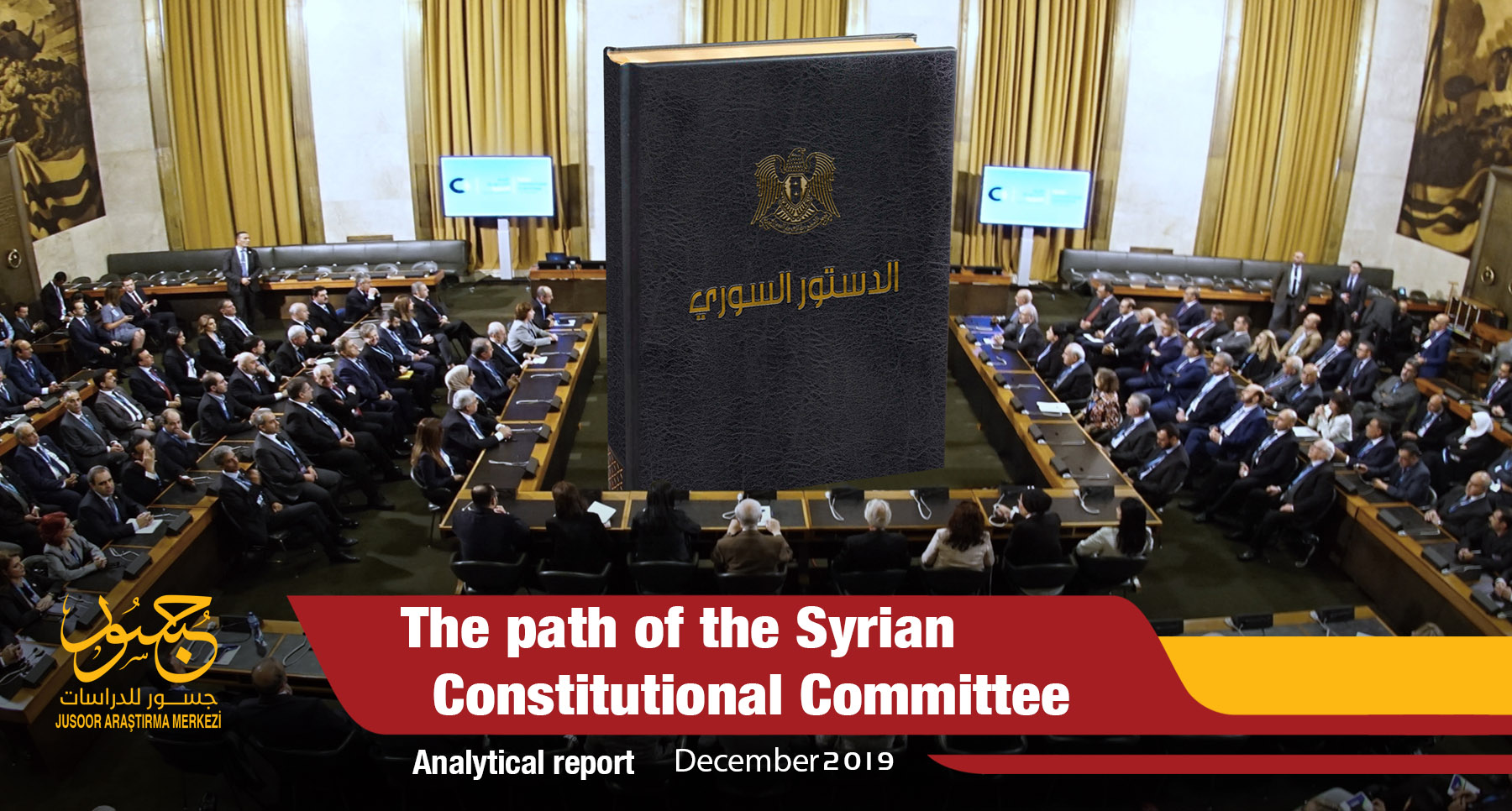Inroduction
On September 23, 2019, United Nations Secretary-General Antonio Guterres announced the formation of the Syrian Constitutional Committee after the approval of the regime and the opposition negotiating body and bypassing the dispute over the list of names.
The proposal of the Constitutional Committee emerged from the Sochi Conference on January 30, 2018, which stated in its closing statement that it will consist of the regime, the opposition, and experts, with a total number of 150 members. Later, the former UN envoy to Syria, Stephen de Mistura, laid out a plan to form the committee so that the regime would have a third and the same for the opposition, while the United Nations would select experts or the third third which would become known as the civil society list. The Constitutional Commission’s proposal is mainly based on de Mistura’s so-called consultative mechanism in the Geneva 6 discussions,
which was the result of international understandings about understanding the “four chains,” which prompted international parties - including the United States - to support the idea of the commission.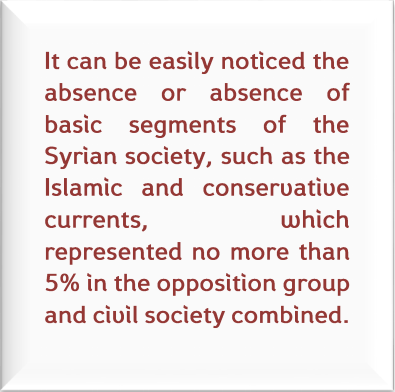
Prior to its launch, the Constitutional Committee faced many obstacles, as there was a heated dispute and controversy over many files, especially with regard to the role of the United Nations, the presidency of the committee, the powers of its work, and its procedural rules, which were approved on September 26, 2019, through a document issued For the United Nations holds the number 775 (2019).
On October 30, 2019, the work of the Syrian Constitutional Committee began in Geneva, and after one day the expanded committee held its first meeting in the presence of all members of the three delegations, and its work continued for two days, during which each member was introduced himself and presented his vision and vision of the country's constitution. Subsequently, a code of conduct for its work and another for procedural practices for the two co-chairs were approved, and this was included in 17 articles for members and 10 items for the two presidents. The names of the mini-body or what is known as the “Drafting Committee”, consisting of 45 members with 15 members, were agreed upon. For each delegation.
First: Analysis of the committee members
The formation of the committee represented the most prominent obstacle to the start of its work, as the local and international powers struggled over the details of this formation, and this conflict ended with a formula that largely reflects regional and international balances, and tries to reverse the formal divisions (gender, religion, sect, region, and nationalism), but it does not reflect the composition. Actual Syrians.
It is easy to notice the absence or absence of basic segments of the Syrian society, such as the Islamic and conservative currents, which represented no more than 5% in the opposition group and civil society combined, and the percentage decreases when adding the group of the regime !.
It appears through the following analysis, that the states that are active in forming the committee have largely attempted to focus on the formal aspects of forming the committee, but they have worked with or without intent to ignore the actual balance, and have chosen to increase the numbers of “independent” individuals at the expense of organized groups, which is the policy that It was followed by these countries in all formations in the previous eight years.
The following is the distribution of committee members according to non-optional divisions and affiliations:
1. Distribution by Gender
Males constitute the majority of members, at 72% of all members, meaning that those who formed the committee have failed to observe the gender ratios in society, even if only soon.
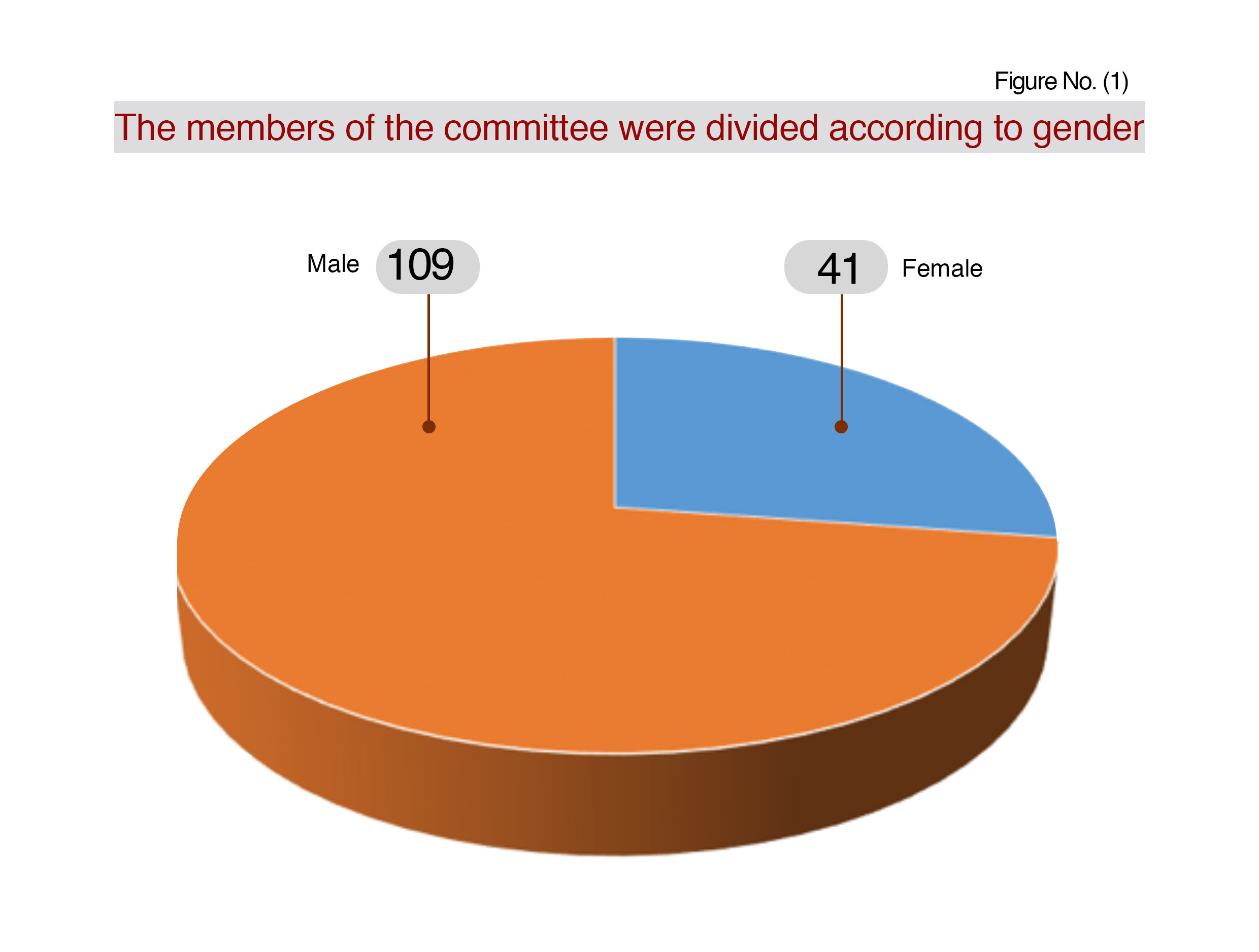
2. Religious and Sectarian Distribution
Muslims constitute the majority of the committee members, with 88% of its members, followed by Christians with 12% (see Figure -2-).
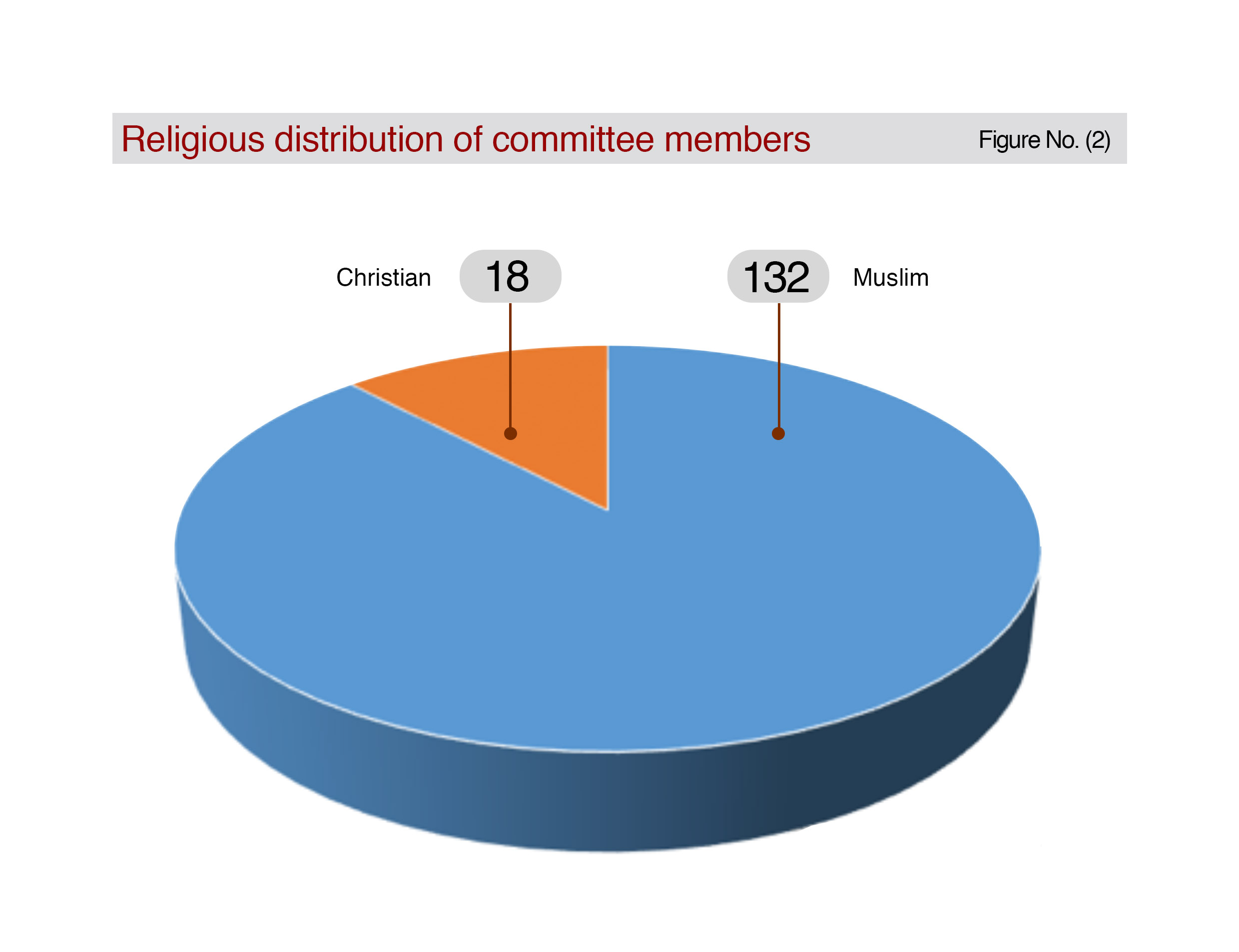
The Sunni community came in the forefront of the sects that represent Muslims, with 68%, followed by the Alawites by 12%, and the Druze by 5%. (See Figure -3-).
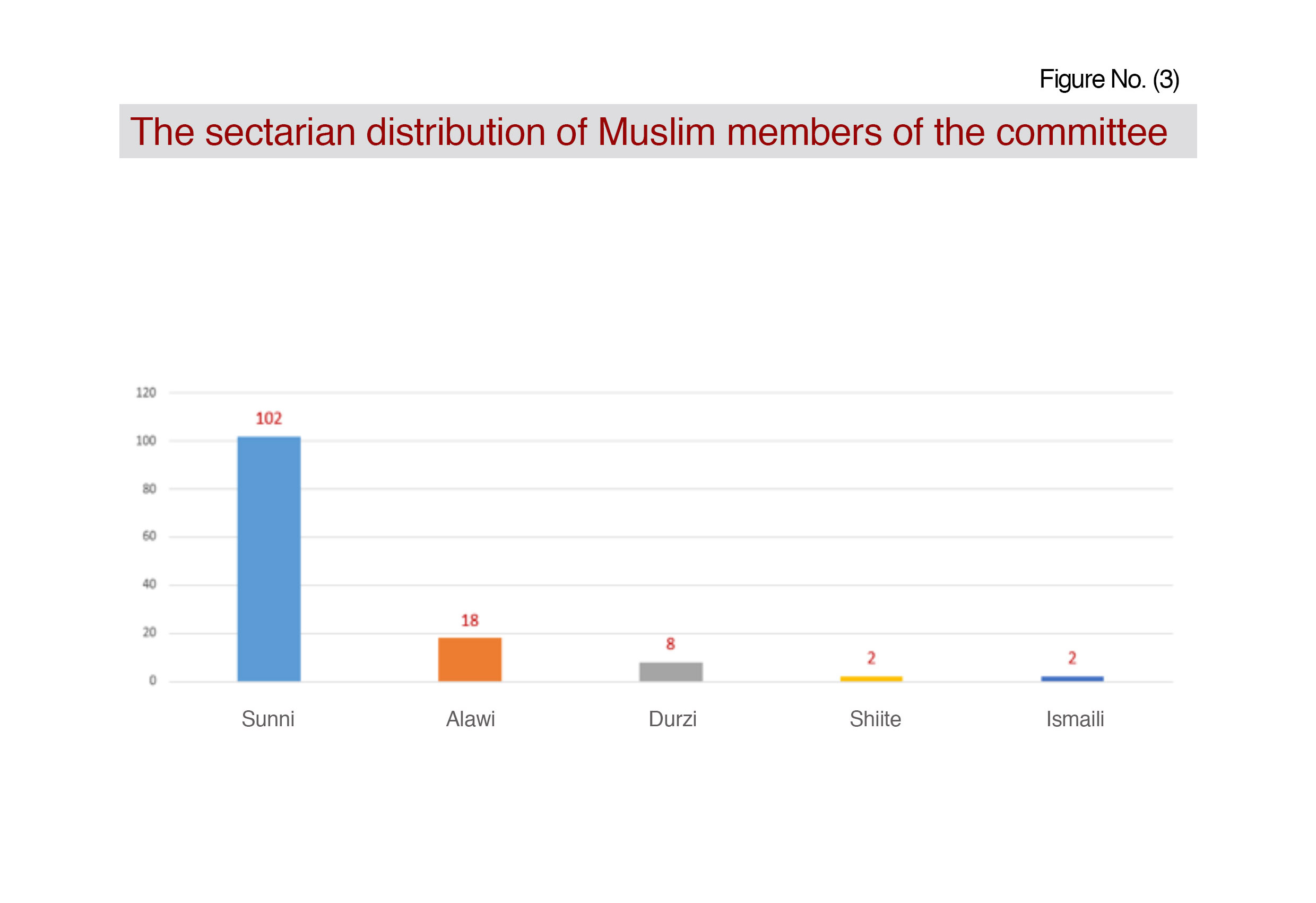
3. Zonal Distribution
The governorate of Damascus came at the forefront of the governorates in the number of members affiliated with it, followed by the governorate of Hasaka, then the governorates of Homs, the countryside of Damascus, Aleppo, Daraa, Tartus, As-Suwayda, Lattakia, Hama, Idlib, Deir Ezzor, Raqqa, and Quneitra.
It is clearly noted the imbalance in the geographical distribution of members, especially in some governorates, such as the governorate of Aleppo, which comes first in terms of population in Syria, but it is ranked fifth in terms of the number of members in the committee.
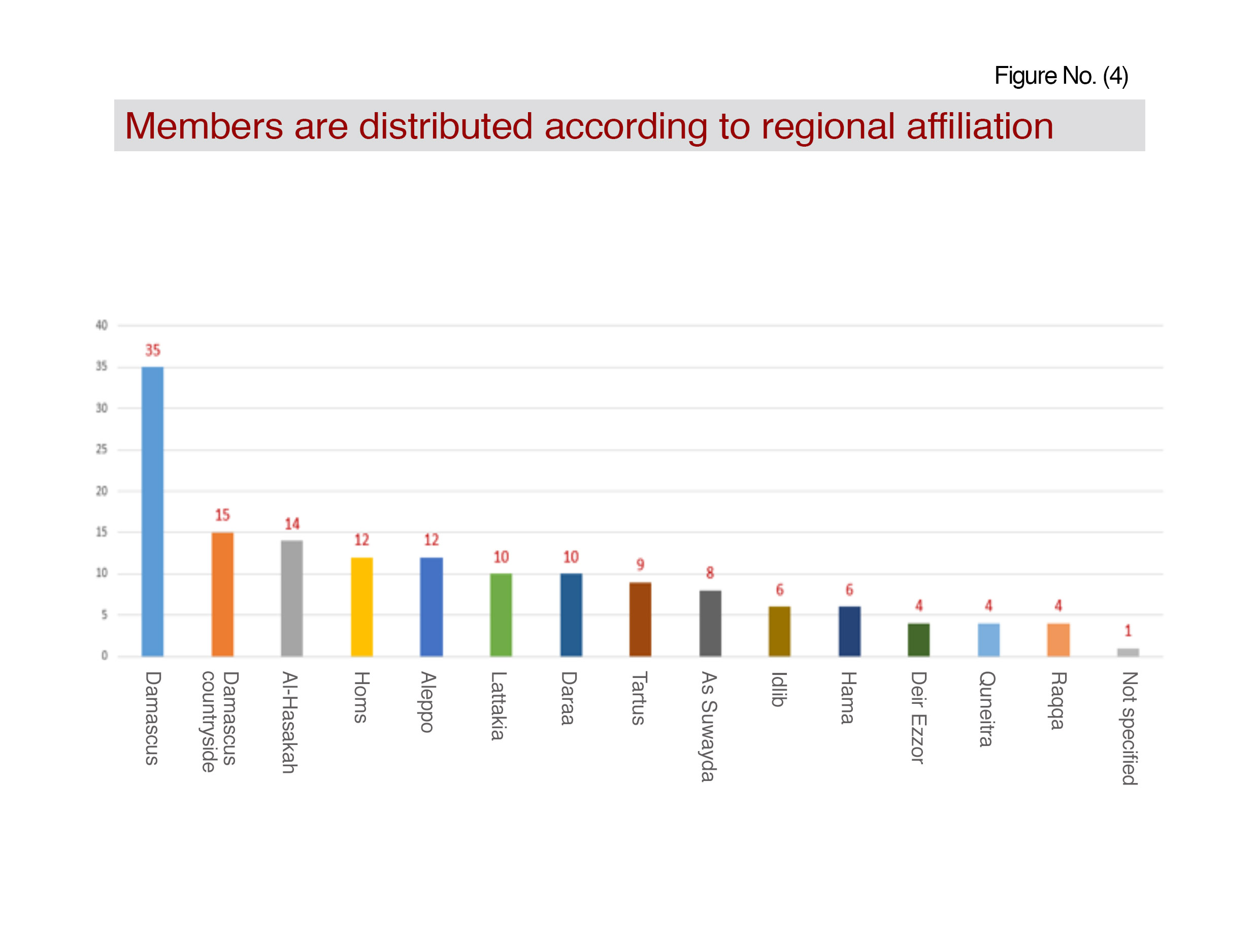
4. Academic Distribution
Analysis of academic degrees held by members of the committee shows that only 36.6% of the committee members have university majors that are related to the law, while 56% of certificates are not related to the legal work, and the specialization is not known to 7% of the members.
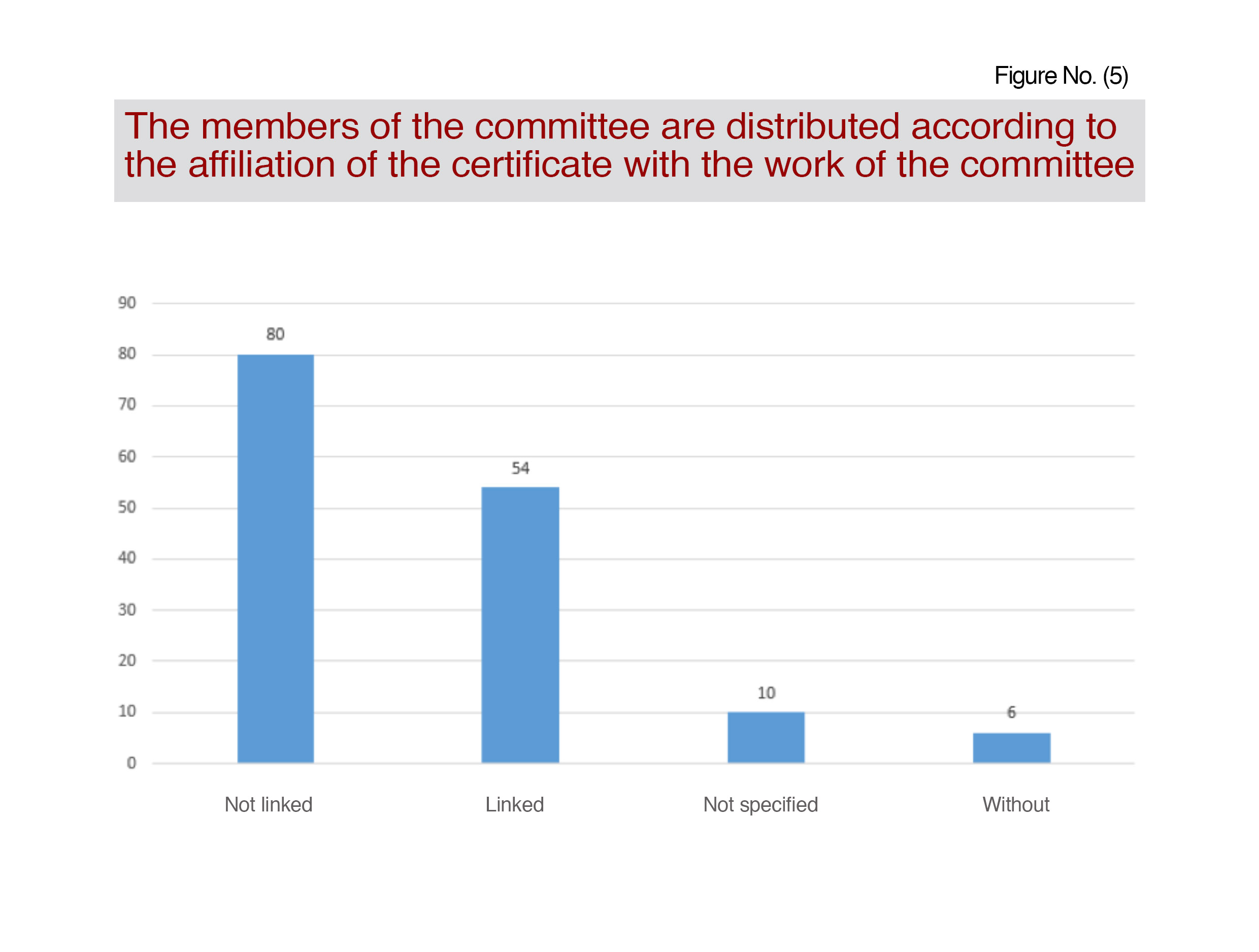
By analyzing the academic achievement level of the committee members, it is clear that 49.3% of the committee members
hold a bachelor’s degree, 26% hold a doctor’s degree, 10% have a master’s degree, and 2% a diploma degree, while the level of educational achievement for 6% of the members is not known (See Figure -6-).
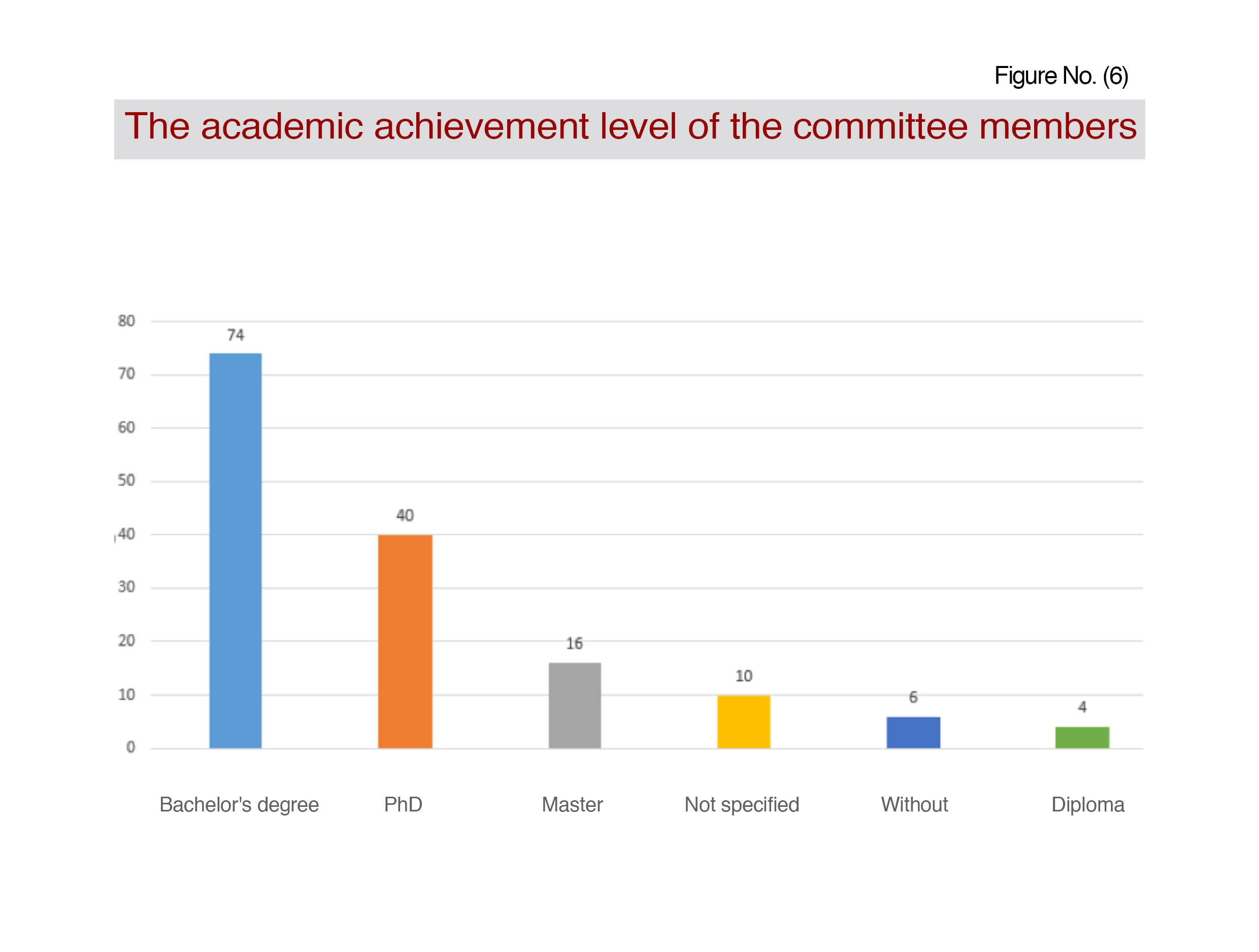
It is also noted that 6 of the members of the committee do not carry a university education, and some of them did not complete even their preparatory education.
It is noted that the regime outperforms the opposition in two bachelors and doctorate groups, and equals civil society at the doctoral level. In contrast, the opposition outperforms the last two groups at the master's level. The proportions are similar between the three groups at the rest of the educational levels (see Figure -7-).
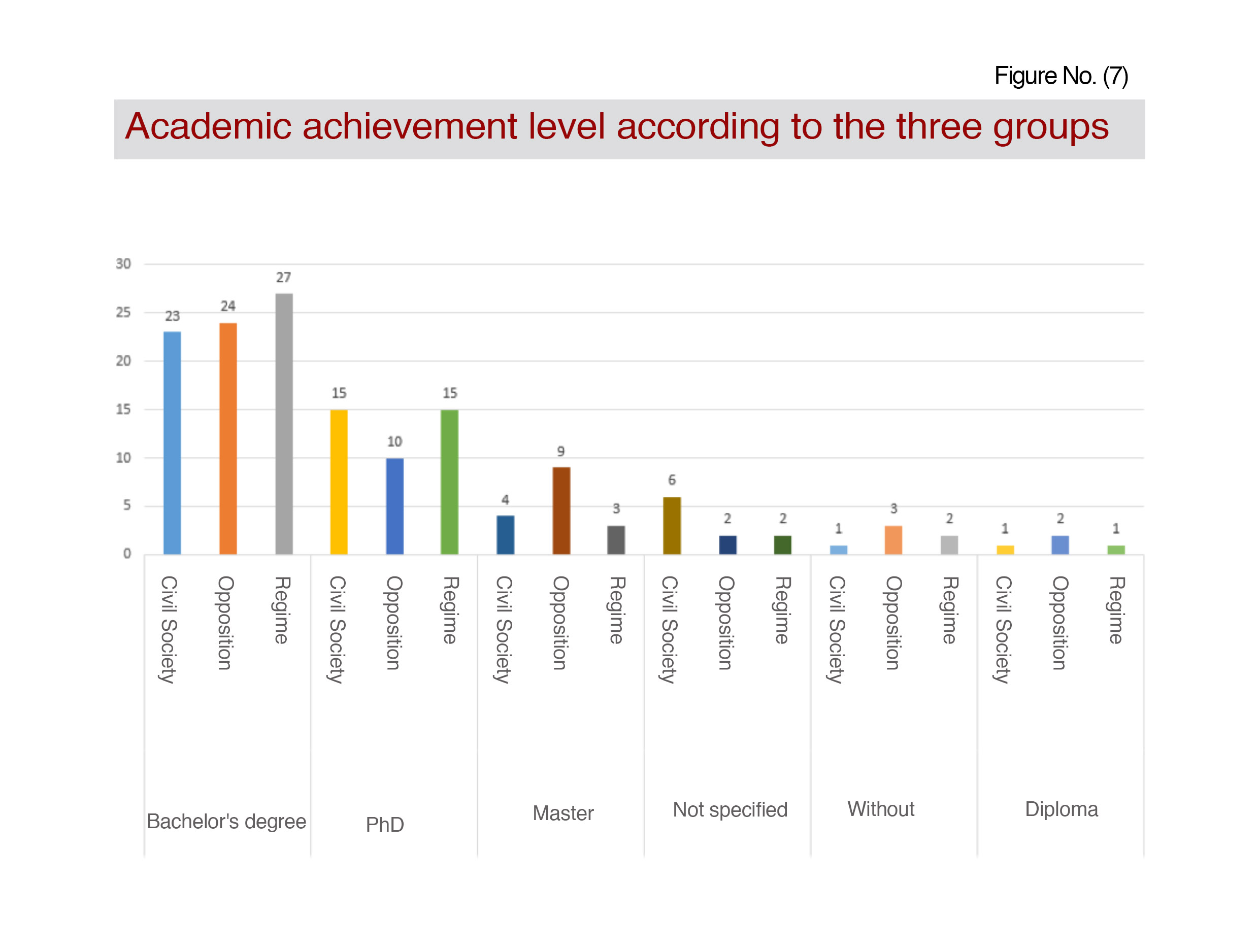
5 . National Distribution
The Arab component won the majority of the committee’s seats, with 90% of the seats, the Kurdish component got about 5%, and the Turkmen component got 2%. The Assyrian, Armenian, Circassian and Syriac components obtained about 0.6% each.
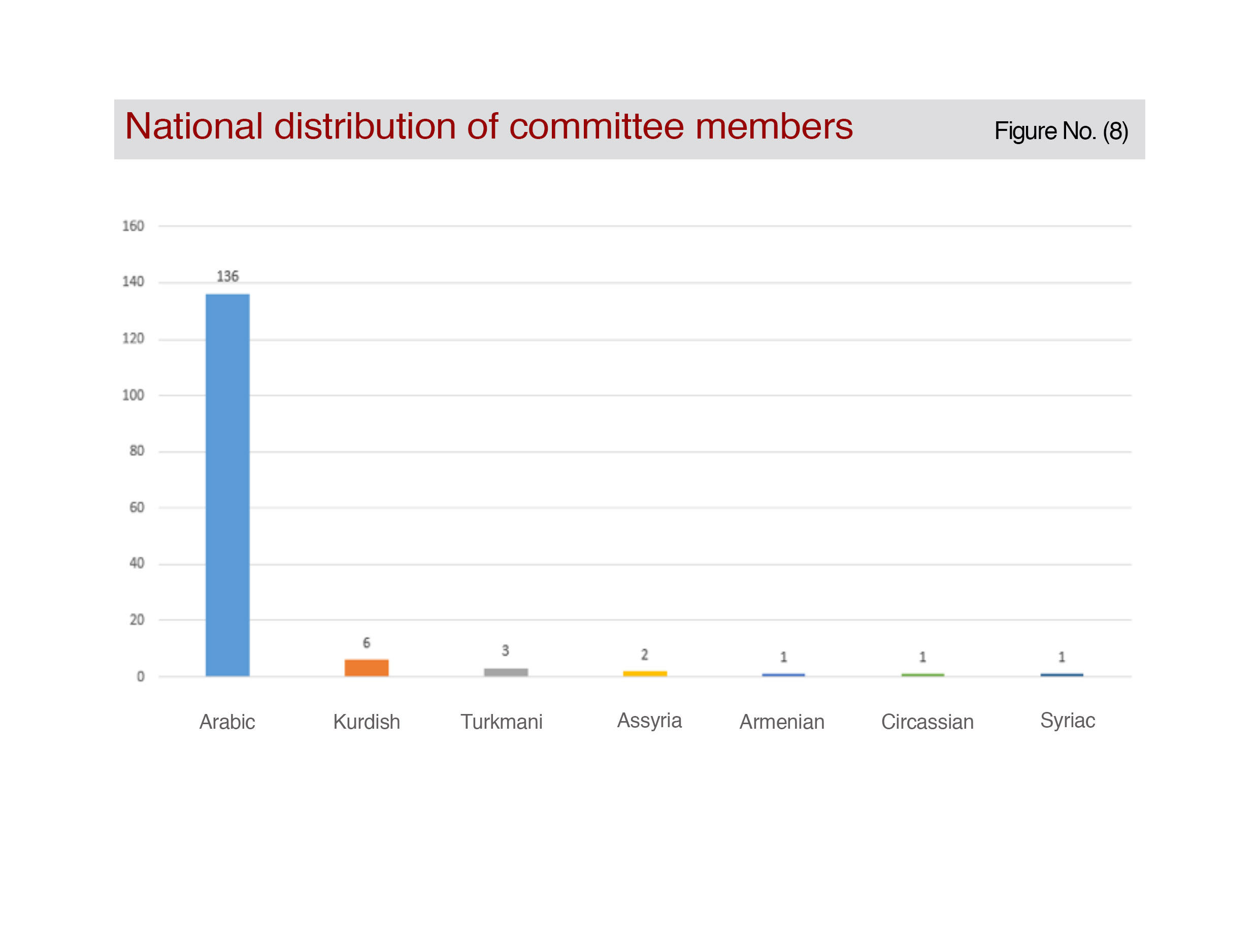
Second: Analysis of the procedural rules according to the United Nations document
• Mandate: According to Article 1, the Constitutional Committee has the right to review the 2012 constitution, including the context of other Syrian constitutional experiences, and to amend the existing constitution or draft a new constitution. It is a formulation that included the parties ’conflict’s approach to the committee’s mandate, meaning that it allowed the regime in one way or another to push for limiting the
constitutional committee’s mission to amend the 2012 constitution.
• Presidency: The fourth article states that the presidency of the Constitutional Committee is in partnership between the Syrian regime and the opposition and that their work is limited to consensus in the presidency of the two enlarged (number 150) and miniature bodies (number 45), as well as in the exercise of powers that have also been restricted in the framework of management and ensuring respect for procedural rules .
It is clear that the United Nations made the Presidency of the Committee a formal position in the Constitutional Committee and that the principle of equality and harmony was for the purpose of overcoming the disputes that had been announced before its formation.
• Facilitation: The fifth article allowed the United Nations Special Envoy, along with the process of facilitating the work of the Constitutional Committee, with the assistance of the co-chairs to reach consensus and convergence of views between members when needed.
In fact, this margin in one way or another places a role for the United Nations in guiding the course of work of the commission in case of need.
• Confidence-building: The sixth article of the document confines itself to mentioning the confidence-building mechanism by ensuring the security and safety of members of the committee, without addressing other measures such as the release of detainees, which are among the tasks of the "Working Group of Detainees" in the Astana process.
The text also misses any mention of the nature of the United Nations response in the event of such a breach by one of the parties.
• Additional provisions: The seventh article of the document gave the Constitutional Committee the flexibility to add and amend what it deems appropriate to the procedural
rules approved by the United Nations. At the same time, however, it neglected setting a time frame for the committee's work, but rather left that open.
The Syrian regime may invest this matter in achieving further procrastination if no proposals in the committee or discussions between its two bodies and members are consistent with its approach to the nature and course of its work.
Third: Analysis of the positions of international actors
1. The United Nations
On September 30, 2019, the United Nations envoy to Syria, Ger Pederson, gave a briefing that included the announcement of the formation of the Constitutional Commission and its bylaws. It reflects in one way or another the position of the United Nations, which can be analyzed as follows:
• It does not appear that the United Nations has an appropriate mechanism and plan for building confidence between the regime and the Syrian opposition even with the launch of the work of the Constitutional Committee, in light of its recognition of the difficulty of seriously entering the path of the political process as a result of each side questioning the intentions of the other.
• The United Nations does not appear to be counting on real work outputs for the Constitutional Commission in a short period of time. This methodology carries a major threat from the possibility of fading what is being accomplished, the return of the
committee, or to stopping the conflict between local powers, or international parties to their commitment to support the their failure to find an appropriate and agreed solution.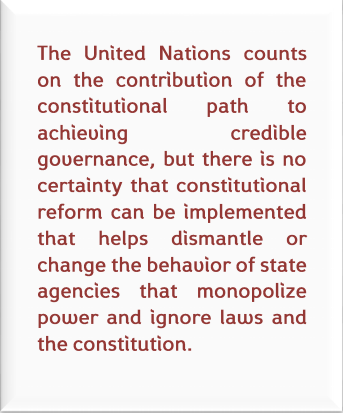
• The United Nations has not announced a clear mechanism and perception about the electoral path that is supposed to come after the entitlement of the Constitutional Committee, and this also applies to public approval of the latter's actions. Failure to announce this perception does not mean that the international organization does not own it, especially as it has a lot of extensive experience in different regions around the world in this field.
• The United Nations counts that the constitutional path contributes to changing the equation of power that stands in the way of achieving a real political process in Syria that leads to a credible rule, but in reality there is no certainty that the possibility of implementing constitutional reform that helps to dismantle or change the behavior of state agencies that It monopolizes power, ignores and violates laws and the constitution.
• Some argue that Security Council resolution 2254 (2015) has prioritized the solution, that the issue of governance comes first, followed by the constitution and then elections, and that the United Nations has exceeded the first priority to the second, while others argue that the resolution did not prioritize these priorities, and that resorting to The constitution and elections baskets, and an agreement on them, could crystallize a clear vision for both sides of the form of the next ruling.
2. The United States
The course of the Constitutional Committee is in full harmony with the American orientations, although it seems, from the directive standpoint, a Russian project. The United States has demonstrated, during the course of the commission’s formation, and during and after the start of its work, support for this presence and attention to detail, which confirms this harmony.
The United States has been keen to have people representing its interests, especially in the opposition and civil society groups, and has been keen to have them in influential positions in the work of the committee, ensuring at least their ability to disrupt.
Washington also provided logistical support and training to some representatives of the opposition and civil society, and generously supported the presence of representatives of the Syrian media close to it, and the corridors of the committee's meetings witnessed a large American diplomatic presence at high levels.
In addition to self-interaction, the United States was keen to activate the work of the small group, specifically to increase pressure on the Russian side.
The United States appears to be seeking a multi-polar political system, whereby power does not remain central to the President, but at the same time responds to the Israeli vision that sees the Assad regime in its current form as a guarantee of its security, and does not wish to make changes in its military and security structure.
This interaction is reminiscent of the great American interest in the "Geneva 2" track, in which the American side was keen to present every detail extensively. It is an attendance that expresses the importance
of the project in the strategy for Syria, or the strategy for dealing with actors in the Syrian file, especially Russia and Iran.
3. The small group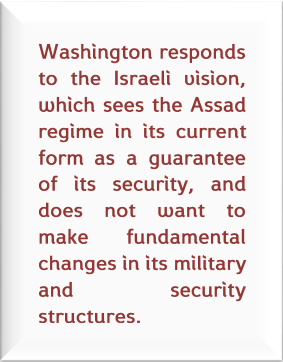
The mini group consisting of the United States, Britain, Germany, France, Saudi Arabia, Egypt and Jordan, adopts a position in support of the United Nations efforts to reach a political solution under its auspices, and the group issued a statement two days after the start of the work of the Constitutional Committee, as it considered it a long-awaited step and requires strong actions and pledges in order to succeed And that it complements the implementation of the rest of the provisions related to Security Council Resolution 2254.
The diplomatic efforts made by the US-led mini-group were a major reason for launching the work of the Constitutional Committee, based on the policy of maximum pressure it exercised on Russia in order to compel the Syrian regime to overcome all the obstacles it was putting in place to prevent the formation of the committee. This policy is based on a package of measures, namely:
• A requirement to participate in the reconstruction and associated development processes, in exchange for serious entry into the political process.
• The requirement to lift economic sanctions on the Syrian regime, in exchange for serious entry into the political process, and the threat of its continuation and expansion in the event of non-compliance.
• Obstructing efforts to return refugees to Syria before the serious start of the political process.
Of course, the small group does not want to make the Constitutional Committee a means used by Russia to control the political process and then reconstruction, but its efforts in this
regard are limited to political and economic pressure, not military.
4. Russia
Russia sought to impose its vision on the form, objectives, and course of the Constitutional Committee, although it made some concessions in response to the extreme pressure policy exercised by the small group.
This does not mean its acceptance of the Syrian regime being forced to make concessions or flexibility conducive to achieving progress in the work of the Constitutional Committee, and in a way that leads to a comprehensive settlement that preserves the interests of all the active forces. Russia possesses a high ability to maneuver and stall.
Although the announcement of the formation of the Constitutional Committee was made in Geneva instead of Damascus, Astana or Sochi, this does not mean that Russia will give up sponsorship of the political process, so it quickly took the initiative to invite the parties of the Constitutional Committee to participate in the fourteenth round of the Astana discussions, and this necessarily means that it does not The negotiations conducted by the commission are seen as merely a legal technique, but rather as a political dimension.
5. Turkey
In recent years, Turkey has adopted a policy of "limiting the damages" resulting from the survival of the Assad regime with Russian-Iranian support, and trying to fortify Turkish interests in Syria, especially regarding the dangers of the Democratic Union Party, which it sees as a wing of the PKK, which is classified as a terrorist in Turkey.
In this context, Turkey is working to ensure that the next political system in Syria is a system that weakens the powers of the president and limits the concentration of powers in his hands, and allows the participation of a greater
number of actors in the authority, in a way that guarantees future Turkish interests.
Turkey understands that the next constitution will be the result of a consensus among the active states, and therefore it will work to ensure these changes in the political system through its relations with the active states, especially Russia and Iran, using all the negotiating papers available to it.
It was remarkable that Turkey abandoned its right to form the opposition group among the members of the committee, a right guaranteed by the Sochi Conference Agreement, as it gave - without a clear reason, according to the description of Russian sources - this right to parties in the opposition, and even to international parties, especially the United States. Perhaps this Turkish trend is reinforced by the conviction that it believes that the next constitution will be the result of international consensus, not the weight of the components of the committee itself!
6. Iran
Iran shows limited political and media interest in the path of the Constitutional Committee, and indeed of the entire political solution, and this path or any of its tools are rarely mentioned in the official Iranian political discourse.
But the absence of interest does not fully reflect the absence of interest in this path, as Iran is working / ensuring its general presence on the negotiating track through the Russian side, and through its representatives to the regime.
However, the long-term Iranian project in Syria, which is totally different from the Russian project, does not stop at the details of a political solution, such as the constitutional committee or others, as Tehran is keen on controlling the joints of the actual state, and that its local allies have enough power tools to guarantee
noted that Tehran is able to deal flexibly with democratic or totalitarian regimes or situations of armed conflict, as its allies have the mechanisms to win elections and work within the democratic system, and they also have mechanisms to overthrow the democratic process as well.
their future impact, Regardless of the form of the political system that will be produced.
And through the analysis of the Iranian project in the countries of the region, it is
Fourth: Analysis of the work of the Constitutional Committee
The first round of the meetings of the Constitutional Committee started between 5 and 8 October 2019, through the meeting of the delegations of the mini-committee, which is responsible for reaching an agreement on constitutional reform, either by making an amendment to the 2012 constitution or by drafting a new constitution for the country, by discussing ideas and proposals that It was presented in the expanded body to determine what works as constitutional principles.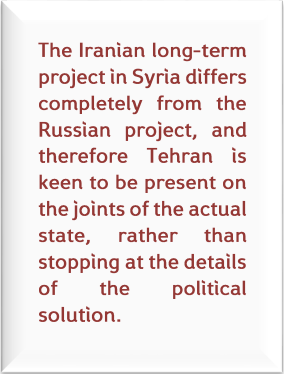
Each delegation in the mini-committee in the first round summarized the ideas and suggestions submitted from the discussions and words that were circulated in the meeting of the expanded body. Then it is grouped with three "no papers" for each group, to be discussed in the second round.
"No Paper" included the Syrian opposition delegation constitutional principles including "ensuring freedom and dignity for Syrians, achieving social justice among them, independence of the judiciary - separation of powers - fair elections - ensuring political pluralism - equal citizenship - establishing the national army and security institutions based on competence - commitment Human Rights - Ensuring the participation of women in institutions by no less than 30% - the Kurdish issue is a national issue.
While “No Paper”, the Syrian regime’s delegation focused on the priority of combating terrorism, implementing
Security Council resolutions related to combating terrorism, and the Syrian people’s solidarity to fight all terrorist groups in Syria, in order to try to reach common ground among members of the Constitutional Committee, and to create the necessary ground to achieve Actual progress in the work of the Committee.
The "No Paper" civil society delegation was divided into two parts, as those close to the Syrian regime focused on "condemning the terrorist organizations' attacks - denouncing the economic sanctions imposed on Syria." While those close to the opposition affirmed the "immediate release of all prisoners of conscience by all parties in Syria - revealing the fate of the forcibly disappeared - forming a national committee to monitor the release of detainees by all parties periodically according to a specific timetable."
On November 25, 2019, the second round of constitutional committee meetings was supposed to start, but this was stalled due to the failure of the Syrian regime and opposition delegations to find an appropriate formula for entering the talks. The delegation of the Syrian regime refused to enter into the discussions of the second round before discussing a set of principles titled "National Pillars of Interest to the Syrian People", which includes "condemning extremism, terrorism and violence and working to combat it - considering all those who bear arms outside the authority of the Syrian state as a terrorist - affirming unity and independence And the sovereignty of Syria through condemning the Turkish and American occupation and other foreign presence outside the consent of the Syrian state and demanding its exit - demanding the lifting of unilateral coercive measures imposed on the Syrian people by Western countries.
Indeed, the behavior and speech of the Syrian regime delegation indicates the following: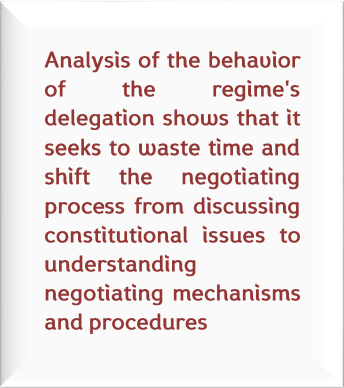
• Lost time by shifting the negotiating process from discussing constitutional issues to understanding negotiating mechanisms and procedures such as re-putting the work place of the Constitutional Committee in Damascus instead of Geneva and the duration of working sessions and national pillars.
• Refraining from making major concessions such as adopting a new constitution and emphasizing the necessity of making amendments to the 2012 constitution, and in the event that he is forced to accept the adoption of a new constitution he will often include items that do not contradict the latter in terms of the form of government and the political system in the country, as according to that The role of the president, state agencies and other issues related to the relationship of power, the state, society and the individual is determined.
• The desire to include the files of some other baskets of the political process in the constitution basket, such as combating terrorism.
On the other hand, the behavior of the Syrian opposition delegation's speech indicates the following:
• There is an understanding of not setting preconditions during the presentation of constitutional issues and bypassing the "amendment or change" complex by focusing on the contents within the context of constitutional reform.
• The existence of an actual desire to achieve progress and progress across the constitutional path, and
to overcome everything that would cause obstruction or obstruction.
• Adherence to the principle of synchronizing the tracks and separating them from each other during the discussion of the issues of the political process included in the "Four Baskets", an idea that was presented by the head of the negotiating body, Nasr Hariri in his press conference.
Summary
• An analysis of the committee members ’affiliations and political orientations shows a clear imbalance in the representation of Syrian society, especially in terms of the absence of the Islamic / conservative spectrum, and the absence of political entities in favor of individuals.
• The process of writing the Syrian constitution and building the form of the next political system will take place within a consensual state among the active states, and the constitutional committee will reflect this situation, regardless of the composition of the committee, and the extent to which each party is represented within the committee members.
• The Assad regime represents one of the most important losers in the process of changing the constitution and the form of the political system, and he has been forced into the committee based on Russian pressure, so he will do everything in his power to disrupt the committee’s work and buy time. However, this will not affect the final outputs, which he will have to accept regardless of the path details.
• It is not possible to achieve progress in the Syrian political process merely by relying on what the constitutional path discussions might lead to. The small group must exert sufficient pressure or
reach a satisfactory understanding with Russia in order to urge and compel the parties of the Constitutional Committee to move forward in its actions and steps.
• There is complete harmony between Russia and the Syrian regime, but this does not negate the existence of fears of the latter that there will be an international understanding on the constitutional path at the expense of its interests and existence.
• There is an exaggerated dependence from the Syrian opposition on the results of the constitutional path, as the scenarios that may result from it do not necessarily mean that they came out with significant or even satisfactory gains, especially if the partnership with the Syrian was worsened in the absence of Bashar al-Assad after the elections in 2021, or by his presence until the elections in 2028 .
• It is very possible that the Syrian constitutional path will fail or falter, especially given that the regime and the opposition have the ability to disrupt the voting process, which amounts to 25%, and the difficulty of obtaining each of them at 75% in order to pass the proposal they want.
• The failure or failure of the constitutional path means the continuation of the military solution, and consequently the return of international actors to trying to impose their approach and interests on the ground at the expense of the Syrians, and this leads to a continuous and complex situation of instability and security in the region and the region.














